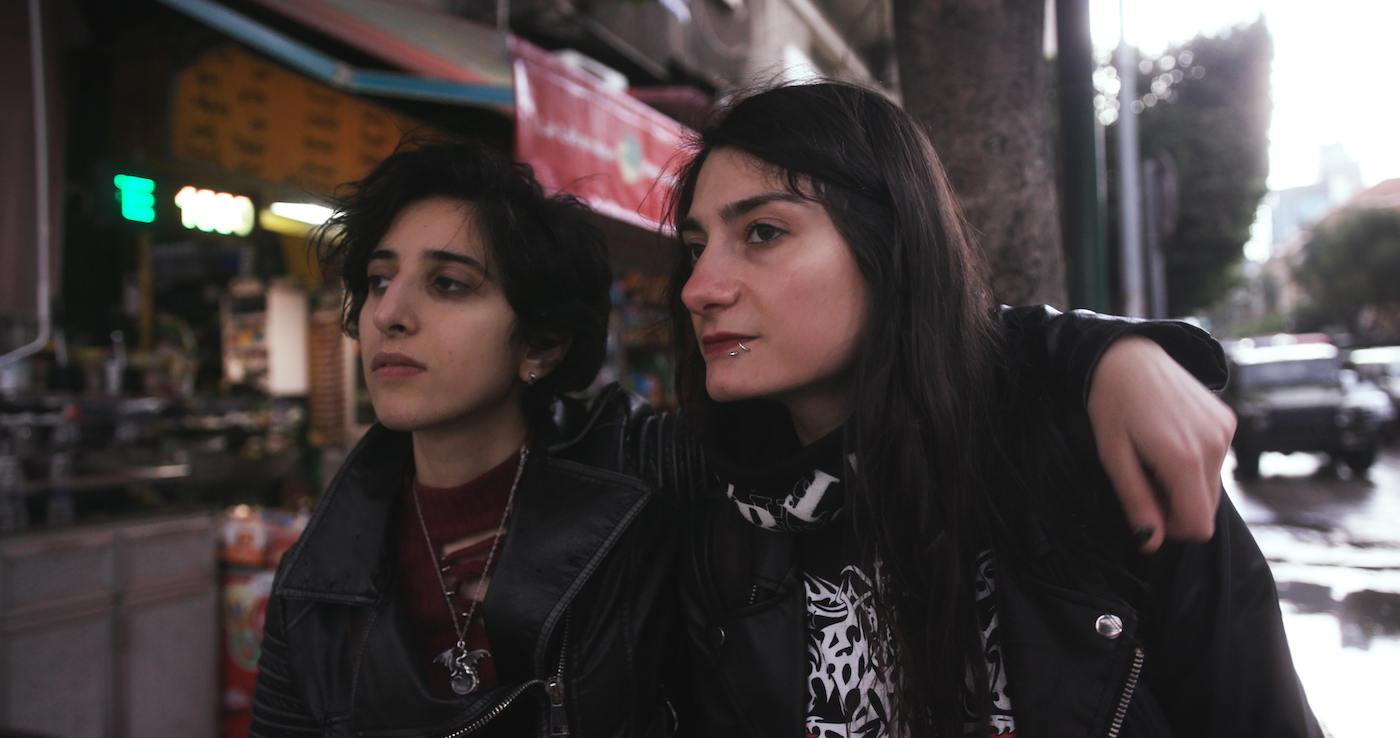What kind of leader would you be in a fractured world, one disinterested in honoring your authenticity? Rita Baghdadi’s documentary Sirens explores this question through 23-year-old musician Lilas Mayassi, who wrestles with friendship, sexuality, and destruction as the leader of the Middle East’s first all-female thrash metal band Slave to Sirens - a Beirut, Lebanon-based group pursuing dreams of rock star fame.
Set against the backdrop of a country on the brink of collapse, and haunted by the shadow of their parents’ civil war, Lilas, her co-founder Shery Bechara, and their bandmates Maya Khairallah, Alma Doumani, and Tatyana Boughaba are Slave to Sirens, a cathartically raucous, thrash metal band, seeking fame and fortune. Their dreams seem well-within reach as they accept an invitation to play Glastonbury in the UK, having been spotted in a major music magazine feature. The show, though, is not the life-changer they anticipate, and once they return to Lebanon, seismic cracks begin rippling out within the group, originating in an incredibly frustrated Lilas.
By day, Lilas teaches music to kids. Living with her mother and younger brother outside of Beirut, it’s only at night that she truly comes alive. Whether she is escaping into musical collaboration and seemingly inevitable conflict with her bandmates, online courting the woman she’s secretly romancing across the border in Syria, or out partying until all hours at the club, Lilas is desperate to express herself. The real her. Lilas is just what Baghdadi intended, a young woman just, “like everyone else: full of dreams and fueled by desire.”
What attracted Baghdadi to this project was her own experience growing up between Maryland and Morocco in a post 9/11 America. She writes, “I was deeply affected by the way Arab characters were treated in the films I saw. They were demonized and belittled, and I couldn’t find a girl like me anywhere.” Meeting Slave to Sirens, she saw an opportunity to tell the kind of story she’d always yearned to see. One positioning Arab women as its stars. Arab women who defy stereotypes, who “curse, scream, thrash and talk openly about sexuality without being sexualized.” Baghdadi achieves this by way of the astounding courage she’s able to capture amongst these young women. Shery, the freest spirit of the bunch, and with whom Lilas shares a hushed past, challenges her bandmate Lilas to confront their truth, to confront her own repression, and to question how her behavior is tearing this band apart. Understanding the larger context of this story set in a country imminently tearing in two, the stakes of Lilas’s awakening both sexually, as a band leader, and as a friend feel terrifying and thrilling; a bold rebellion clearly of thrash metal proportions.
As Slave to Sirens, Lilas, Shery, Maya, Alma, and Tatyana breathe new, silly, compassionate life into the historically masculine thrash metal genre. Mind you, on stage, they all out rage. A tidal wave of oppression, instability, and fear rocking out through their respective instruments. Yet behind the scenes, their dynamic is soft, playful, and delightfully innocent. While these women are very much still unraveling their identities, both collectively and individually, the most compelling moments throughout this documentary are those of togetherness and love. It very much seems like without the security of this love they have for one another, creating a unique cohort of safety amidst the chaos of an impending crumbling, complex Lebanon, the courage to take the stage with such gusto and raw fury would never exist. Through the Sirens, we bear witness to the kind of community possible when women connect with one another and rise up together, wielding sound as a weapon in the war for female empowerment.
With that outside world their fighting to change in mind, the extent to which Lilas and Shery in particular let the cameras capture their painfully imperfect personal lives, with the looming backdrop of a less-than-understanding culture lording over them - shows the extraordinary difference their hoping to inspire in the Middle East and elsewhere in the World where being authentic is not always encouraged. Baghdadi finds ominous ways throughout this film to temper the raw optimism of this thrash metal sisterhood with the bitter reality of conflict and contempt surrounding them. Whether that’s with imagery of protests enveloping the women’s otherwise mundane moments, or intimate conversations with family members who are less than enthused by the paths these women have chosen to walk, the threats throughout are very real. Even so, Baghdadi makes sure to find diversity in the band’s external influences, painting a portrait of Lebanese culture that is not a one-noted blanket of oppression. We see a Lebanon deeply divided - skewing conservative in some ways and progressive in others. And this division is not dormant. There is a palpable yearning to hear one another, to be heard - to convince others that yours is the right way forward for a better Lebanon. The freedom of self-expression through music becomes one layer within that larger conversation.
As in any good music documentary, sound is key. Interwoven amidst Slave to Sirens' original music, Jean-Baptiste de Laubier aka Para One’s soundtrack is an active participant in this film’s drama. Much like his original soundtrack composition on Celine Sciamma’s Portrait of a Lady on Fire, Para One regularly reaches for tools like dissonance and silence, orchestrating a catharsis that often mirrors the trauma of living in a country disinterested in honoring all of who you are. As the friendships in front of us begin cracking under the pressures of a world regulated against celebrating a group of women like this - ready to bare their souls on stage, the one small corner of truth they’ve managed to carve out for themselves - it’s not music, but sound that overwhelms us. Impossible to comprehend other than as violent disruption. It's in these moments that Baghdadi’s vision, through the Sirens’ story, grants us access into the struggle of finding your identity in a world largely disinterested in celebrating, embracing, or even acknowledging all of who you are. Crushed under raw tone, the weight of this struggle becomes undeniable. Almost as deafening as the moments of silence.
A beautifully balanced portrait of young women, screaming to be heard within their deafeningly oppressive culture, Sirens succeeds in delivering the one thing every revolution needs most, hope. Defining oneself is never easy, but within this courageous story of five young women, rocking their ways toward a better life, there is remarkable resilience. A compelling reminder that music can be a powerful catalyst in the fight for freedom.
Rating: A



